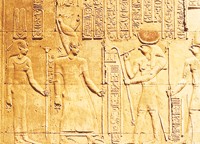1) Hellenism
[英]['helinizəm] [美]['hɛlɪn,ɪzəm]


希腊化
1.
Change or Not——The orient during the period of Hellenism;


“化”之能与不能——希腊化时期的东方世界
2) Hellenism
[英]['helinizəm] [美]['hɛlɪn,ɪzəm]


希腊文化
1.
Hebraic and Hellenism is the genesis of west culture.


两者接轨碰撞融合的历史原因:一是由于希腊文化能够接受基督教文化;二是希伯来文化自身内在的元素发生了变化。
2.
This thesis mainly discusses James s last complete novel The Golden Bowl by using Matthew Arnold s cultural terms Hellenism and Hebraism .
本论文以马修·阿诺德的“希腊文化”和“希伯来文化”论述为依据,讨论他的最后一部完整的长篇小说《金碗》,旨在通过梅奇和阿美利哥的婚姻来分析美国文化和欧洲文化的冲突和交融。
3) Greek culture


希腊文化
1.
As a poet of now and then,Frost is familiar with ancient Greek culture and accomplished in adopting persona and subject matter from the ancient literature.
作为“交替性诗人”的弗罗斯特熟谙古希腊文化,善于从古希腊文学中吸取创作素材。
2.
As we know that Greek culture has its duality,which in general,is represented by the myths in terms of contrasting or complementary pairs of qualities,especially by the duality existing in the characters of the mythological figures.
希腊文化具有双重性,而且这种双重性可以从神话中一对对的对立而又互补的特性上体现出来,尤其体现在神话人物自身性格的双重性上。
3.
The reason why the ancient Greek culture came to be so open is as follows: the marine culture caused by its supreme physical geographical environment; the commercial culture caused by its thriving trade economy; the relaxed political atmosphere provided by its highly developed democratic system of the city-state; and its overseas colonial activities over a long period of .
古希腊文化具有高度的开放性 ,这是推动希腊文化发展壮大并且取得辉煌成就的一个重要动因。
4) Hellenization


泛希腊化
5) ancient Greek culture


古希腊文化
1.
As an important part of the history of western culture,ancient Greek culture had a profound influence on the development of it.
古希腊文化是西方文化历史长河中的重要篇章,并对西方文化发展产生了深远影响。
2.
The ancient Greek culture is the cradle of the western civilization.


古希腊文化是西方文明的摇篮,探讨古希腊文化繁荣的原因一直是国内知识界研究的热点。
3.
The forming and developing course of ancient Chinese culture and ancient Greek culture has received deep affection from ecological status.
中国古代文化和古希腊文化在其生成和发展的过程中深受生态状况影响。
6) Hellenistic Religion


希腊化宗教
1.
Oriental Tradition in Hellenistic Religion;


试析希腊化宗教中的东方传统
补充资料:希腊化时代
| 希腊化时代 Hellenistic age 从公元前323年古代马其顿国王亚历山大大帝去世到公元前30年罗马征服托勒密王朝统治下的埃及这个时期地中海东部诸国的历史。希腊化一词最早出自德国历史学家J.G.德罗伊森(1808~1884)的《希腊化史》一书。
亚历山大死后,他的部将之间发生了争权夺利的激烈斗争。公元前3世纪上半叶陆续形成一系列各具特色的希腊化国家。其中最重要的有以埃及为中心的托勒密王国、以叙利亚为中心的塞琉西王国和以马其顿为中心的马其顿王国。公元前229年起 ,罗马不断向地中海东部地区扩张,利用希腊化诸国的各种内外矛盾制造不和并使之相互削弱,必要时诉诸战争,先后于前168、前64、前30年分别灭亡马其顿、塞琉西和托勒密王国,逐步使各希腊化地区并入罗马。 希腊化时代地中海东部地区社会生产力有所提高,农业、手工业和商业都有一定程度的发展。所有希腊化国家的主要经济部门都是农业。包括埃及的亚历山大里亚等工商业中心在内的一系列城市的出现,许多地区之间商路的建立,流通货币的大量增加,都说明商品经济有所发展。频繁的战争和大量奴役战俘,使奴隶数量有所增加。由于不同文化的相互交流和影响,生产和战争的需要,各族人民交往的增加以及各国国王采取的一些有利于文化发展的措施,数学、物理学、天文学等都有很大发展,欧几里得、阿基米德、阿里斯塔克等为其代表。埃及亚历山大里亚博物馆及其图书馆,在当时享有国际性学府的声誉。 希腊化时代占主导地位的政体,是存在地区差异的以国王为中心的君主专制。大批马其顿人和希腊人移居埃及和西亚各地,使在很大程度上与希腊城邦体制有关的城市制度在西亚等地得到发展。除以马其顿人和希腊人为公民主体的城市外,还有一些各地原有的以寺庙为中心的城市或公社。 |
说明:补充资料仅用于学习参考,请勿用于其它任何用途。
参考词条
